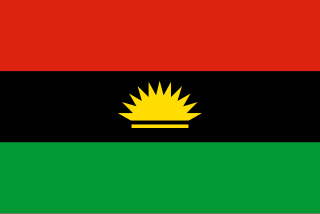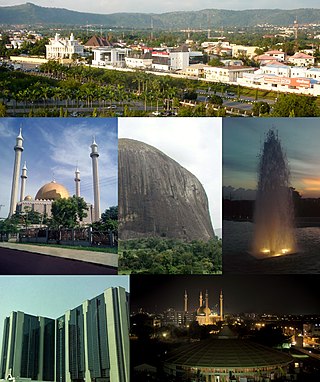
Nigeria, officially the Federal Republic of Nigeria, is a country in West Africa. It is situated between the Sahel to the north and the Gulf of Guinea to the south in the Atlantic Ocean. It covers an area of 923,769 square kilometres (356,669 sq mi), and with a population of over 225 million, it is the most populous country in Africa, and the world's sixth-most populous country. Nigeria borders Niger in the north, Chad in the northeast, Cameroon in the east, and Benin in the west. Nigeria is a federal republic comprising 36 states and the Federal Capital Territory, where the capital, Abuja, is located. The largest city in Nigeria is Lagos, one of the largest metropolitan areas in the world and the second-largest in Africa.

The Federal government of Nigeria is composed of three distinct branches namely the legislative, executive, and judicial, whose powers are vested and bestowed upon them by the Constitution of the Federal Republic of Nigeria, the National Assembly, the President, and lastly the federal courts, which includes the Supreme Court which is regarded as the highest court in Nigeria respectively. One of the major functions of the constitution is that it provides for separation and balance of powers among the three branches and aims to prevent the repetition of past mistakes made by the government, some other functions of the constitution includes that it divides power between the federal government and the states and it also protects various individual liberties of the citizens of the nation.

Biafra, officially the Republic of Biafra, was a partially recognised secessionist state in West Africa that declared independence from Nigeria and existed from 1967 until 1970. Its territory consisted of the predominantly Igbo-populated former Eastern Region of Nigeria. Biafra was established on 30 May 1967 by Igbo military officer and Eastern Region governor C. Odumegwu Ojukwu under his presidency, following a series of ethnic tensions and military coups after Nigerian independence in 1960 that culminated in the 1966 massacres of Igbo people and other Eastern ethnic groups living in northern Nigeria. The military of Nigeria proceeded to invade Biafra shortly after its secession, resulting in the start of the Nigerian Civil War.

Abuja is the capital and eighth most populous city of Nigeria. Situated at the centre of the country within the Federal Capital Territory (FCT), it is a planned city built mainly in the 1980s based on a master plan by International Planning Associates (IPA), a consortium of three American planning and architecture firms made up of Wallace, Roberts, McHarg & Todd as the lead, Archisystems International, and Planning Research Corporation. The Central Business District of Abuja was designed by Japanese architect Kenzo Tange. It replaced Lagos, the country's most populous city, as the capital on 12 December 1991.

Lagos is the largest city in Nigeria and the second most populous city in Africa, with a population of 15.4 million as of 2015 within the city proper. Lagos was the national capital of Nigeria until December 1991 following the government's decision to move their capital to Abuja in the center of the country. The Lagos metropolitan area has a total population of roughly 23.5 million as of 2018, making it the largest metropolitan area in Africa. Lagos is a major African financial center and is the economic hub of Lagos State and Nigeria at large. The city has been described as the cultural, financial, and entertainment capital of Africa, and is a significant influence on commerce, entertainment, technology, education, politics, tourism, art, and fashion. Lagos is also among the top ten of the world's fastest-growing cities and urban areas. The megacity has the fourth-highest GDP in Africa and houses one of the largest and busiest seaports on the continent. The Lagos metropolitan area is a major educational and cultural centre in Sub Saharan Africa. Due to the large urban population and port traffic volumes, Lagos is classified as a Medium-Port Megacity.
The naira is the currency of Nigeria. One naira is divided into 100 kobo.

Nigeria is a federation of 36 states and 1 federal capital territory. Each of the 36 states is a semi-autonomous political unit that shares powers with the federal government as enumerated under the Constitution of the Federal Republic of Nigeria. The Federal Capital Territory (FCT), is the capital territory of Nigeria, and it is in this territory that the capital city of Abuja is located. The FCT is not a state but is administered by elected officials who are supervised by the federal government. Each state is subdivided into local government areas (LGAs). There are 774 local governments in Nigeria. Under the constitution, the 36 states are co-equal but not supreme because sovereignty resides with the federal government. The constitution can be amended by the National Assembly, but each amendment must be ratified by two-thirds of the 36 states of the federation.

The Igbo people are an ethnic group in Nigeria. They are primarily found in Abia, Anambra, Ebonyi, Enugu, and Imo States. A sizable Igbo population is also found in Delta and Rivers States. Large ethnic Igbo populations are found in Cameroon, Gabon, and Equatorial Guinea, as well as outside Africa. There has been much speculation about the origins of the Igbo people, which are largely unknown. Geographically, the Igbo homeland is divided into two unequal sections by the Niger River—an eastern and a western section. The Igbo people are one of the largest ethnic groups in Africa.

The Peoples Democratic Party is one of the two major contemporary political parties in Nigeria, along with its main rival, the All Progressives Congress.

The president of the Federal Republic of Nigeria is the head of state and head of government of the Federal Republic of Nigeria. The president directs the executive branch of the federal government and is the commander-in-chief of the Nigerian Armed Forces.

Muhammadu Buhari(listen) is a Nigerian politician, who has served as president of Nigeria since 2015.

The Nigerian Civil War, also known as the Nigerian–Biafran War or the Biafran War, was a civil war fought between Nigeria and the Republic of Biafra, a secessionist state which had declared its independence from Nigeria in 1967. Nigeria was led by General Yakubu Gowon, while Biafra was led by Lieutenant Colonel Chukwuemeka "Emeka" Odumegwu Ojukwu. Biafra represented the nationalist aspirations of the Igbo ethnic group, whose leadership felt they could no longer coexist with the federal government dominated by the interests of the Muslim Hausa-Fulanis of Northern Nigeria. The conflict resulted from political, economic, ethnic, cultural and religious tensions which preceded the United Kingdom's formal decolonization of Nigeria from 1960 to 1963. Immediate causes of the war in 1966 included a military coup, a counter-coup, and anti-Igbo pogroms in Northern Nigeria. Control over the lucrative oil production in the Niger Delta also played a vital strategic role, and was a factor in the strong French support for Biafra.

The Nigeria national football team represents Nigeria in men's international football. Governed by the Nigeria Football Federation (NFF), they are three-time Africa Cup of Nations winners, with their most recent title in 2013. In April 1994, the Nigerian national football team was ranked 5th in the FIFA rankings, the highest FIFA ranking position ever achieved by an African football team. Throughout history, the team has qualified for six of the last eight FIFA World Cups, missing only the 2006 and 2022 editions. They have reached the round of 16 on three occasions. Their first World Cup appearance was the 1994 edition. The team is a member of FIFA and Confederation of African Football (CAF).

Edo, commonly known as Edo State, is a state located in the South-South geopolitical zone of Nigeria. As of 2006 National population census, the state was ranked as the 24th populated state (3,233,366) in Nigeria. The state population figures is expected to be about 8,000,000 in 2022. Edo State is the 22nd largest State by landmass in Nigeria. The state's capital and city, Benin City, is the fourth largest city in Nigeria, and the centre of the country's rubber industry. Created in 1991 from the former Bendel State, is also known as the heart beat of the nation. Edo State borders Kogi State to the northeast, Anambra State to the east, Delta State to the southeast and southsouth and Ondo State to the west.

The Nigeria Football Federation is Nigeria's football governing body. It was formally launched in 1945 and formed the first Nigerian national football team in 1949. It joined CAF in 1959 and FIFA in 1960. The NFF headquarters is located in the city of Abuja.

The House of Representatives is the lower chamber of Nigeria's bicameral National Assembly. The Senate is the upper chamber.

Nigerians or the Nigerian people are citizens of Nigeria or people with ancestry from Nigeria. The name Nigeria was taken from the Niger River running through the country. This name was allegedly coined in the late 19th century by British journalist Flora Shaw, who later married Baron Frederick Lugard, a British colonial administrator. Nigeria is composed of various ethnic groups and cultures and the term Nigerian refers to a citizenship-based civic nationality. Nigerians derive from over 250 ethno-linguistic groups. Though there are multiple ethnic groups in Nigeria, economic factors result in significant mobility of Nigerians of multiple ethnic and religious backgrounds to reside in territories in Nigeria that are outside their ethnic or religious background, resulting in the mixing of the various ethnic and religious groups, especially in Nigeria's cities. The English language is the lingua franca of Nigerians. Nigeria is divided roughly in half between Muslims, who live mostly in the north, and Christians, who live mostly in the south; indigenous religions, such as those native to the Igbo and Yoruba ethnicities, are in the minority.

Boko Haram, officially known as Jamā'at Ahl as-Sunnah lid-Da'wah wa'l-Jihād, is an Islamist militant organization based in northeastern Nigeria, which is also active in Chad, Niger, northern Cameroon, and Mali. Boko Haram was the world's deadliest terror group during part of the mid-2010s according to the Global Terrorism Index. In 2016, the group split, resulting in the emergence of a hostile faction known as the Islamic State's West Africa Province.

The Boko Haram insurgency began in July 2009, when the militant Islamist and jihadist rebel group Boko Haram started an armed rebellion against the government of Nigeria. The conflict is taking place within the context of long-standing issues of religious violence between Nigeria's Muslim and Christian communities, and the insurgents' ultimate aim is to establish an Islamic state in the region.















